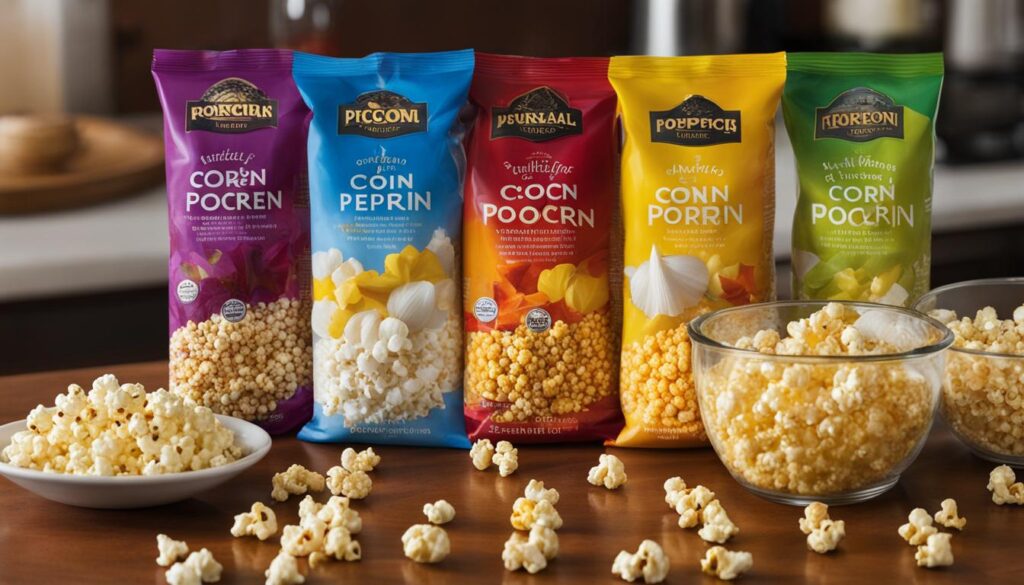When it comes to making popcorn at home, there are plenty of options for cooking oils. One popular choice is peanut oil. But can you really use peanut oil to make popcorn? We’re here to answer that question and explore the benefits of using peanut oil for popcorn.
Key Takeaways:
- Peanut oil is a great choice for making popcorn at home, thanks to its nutty taste and high smoke point.
- It enhances the flavor of popcorn and pairs well with both savory and sweet toppings.
- Peanut oil comes in different types, including refined, cold-pressed, roasted, and blends, each offering a unique flavor profile.
- Using peanut oil for popcorn provides health benefits such as lowering LDL cholesterol and improving blood sugar levels.
- However, consuming excessive amounts of peanut oil may contribute to weight gain and oxidative stress.
Different Types of Peanut Oil for Popcorn
When it comes to making popcorn, peanut oil offers a variety of options that can enhance your popcorn experience. Let’s take a closer look at the different types of peanut oil available:
1. Refined Peanut Oil
Refined peanut oil is a commonly used option for cooking and making popcorn. It has a neutral flavor, which means it won’t overpower the taste of your popcorn. Refined peanut oil also undergoes a refining process that removes allergens, making it a safe choice for those with peanut allergies.
2. Cold-Pressed Peanut Oil
Cold-pressed peanut oil retains its natural flavors and aromas, making it a great option for popcorn enthusiasts who want to enjoy the nutritional benefits and high smoke point of peanut oil without the strong nutty flavor. This type of peanut oil is extracted through a process that does not involve high heat, ensuring that the oil maintains its natural qualities.
3. Roasted Peanut Oil
If you’re looking to add a rich, nutty taste to your popcorn, roasted peanut oil is the way to go. Made by roasting peanuts before extracting the oil, this variety offers a deeper flavor profile and a golden color. Roasted peanut oil is often used as a drizzle to enhance the taste of cooked food, and it can do the same for your popcorn.
4. Peanut Oil Blends
If you’re on a budget but still want to enjoy the benefits of peanut oil, peanut oil blends are a great option. These blends combine peanut oil with other oils like soybean oil, providing a more affordable alternative. While the flavor may be slightly different compared to using pure peanut oil, blends are still a good choice for making delicious popcorn.
By understanding the different types of peanut oil available, you can choose the one that best suits your taste preferences and budget. Whether you opt for refined peanut oil, cold-pressed peanut oil, roasted peanut oil, or a peanut oil blend, each type offers a unique flavor and can elevate your popcorn game. Experiment with different options to find the perfect peanut oil for your next batch of homemade popcorn!
Advantages and Disadvantages of Using Peanut Oil for Popcorn

When it comes to making popcorn, using peanut oil offers several advantages. First and foremost, peanut oil adds a unique nutty flavor to the popcorn, enhancing its taste and making it a truly enjoyable snack. Additionally, peanut oil has a high smoke point, ensuring that the kernels don’t burn easily during the popping process. This means that you’ll have perfectly popped popcorn every time without any unpleasant burnt taste. The high smoke point also makes peanut oil suitable for high-heat cooking, making it ideal for popcorn preparation.
Another advantage of using peanut oil for popcorn is its versatility. Peanut oil pairs well with both savory and sweet flavors, allowing you to experiment with different seasonings and toppings to create your perfect snack. Whether you prefer classic butter and salt or more adventurous combinations like chocolate or caramel, peanut oil will complement your chosen flavor profile.
However, it’s important to be aware of the potential disadvantages of using peanut oil for popcorn as well. One drawback is that peanut oil is high in calories, so consuming excessive amounts of popcorn cooked in peanut oil could contribute to weight gain. Additionally, peanut oil contains polyunsaturated fats, which can oxidize and lead to oxidative stress when consumed in large quantities. This has been linked to various health issues, so it’s important to practice moderation when enjoying popcorn cooked in peanut oil.
Advantages of Peanut Oil for Popcorn:
- Unique nutty flavor
- High smoke point prevents burnt kernels
- Versatile for pairing with different flavors
Disadvantages of Peanut Oil for Popcorn:
- High in calories, can contribute to weight gain
- Polyunsaturated fats may lead to oxidative stress in large quantities
When comparing peanut oil to other oils for popcorn, it’s important to consider personal preferences and health considerations. The best oil for making popcorn will depend on individual taste preferences, desired flavor profile, and dietary needs. Some alternative oils to consider include soybean oil, coconut oil, canola oil, and vegetable oil. Each of these oils has its own unique qualities and flavors, so experiment to find your favorite!
Other Oils for Popcorn Making

While peanut oil is a popular choice for making popcorn, there are other oils that can be used as well. Here are some alternatives to consider:
Soybean Oil for Popcorn
Soybean oil is a commonly used oil for popcorn making. It has a neutral flavor, allowing the taste of the popcorn and any added toppings to shine. Soybean oil also has a high smoke point, making it suitable for high-heat cooking and preventing the popcorn from burning easily.
Coconut Oil for Popcorn
Coconut oil is another popular option for popcorn making. It has a distinct flavor that adds a delicious twist to the taste of popcorn. Coconut oil also has a high smoke point and gives the popcorn a crispy texture. It pairs well with both savory and sweet flavors, making it a versatile choice.
Canola Oil for Popcorn
Canola oil is a versatile oil that works well for making popcorn. It has a neutral flavor, allowing the popcorn’s taste to take center stage. Canola oil also has a high smoke point, ensuring that the popcorn pops perfectly without burning. It is a healthier option as it contains less saturated fat compared to some other oils.
Vegetable Oil for Popcorn
Vegetable oil is a common choice for popcorn making. It has a mild flavor that doesn’t overpower the taste of the popcorn. Vegetable oil also has a high smoke point, making it suitable for high-heat cooking. It is an affordable and readily available option for making delicious homemade popcorn.
Ultimately, the choice of oil for popcorn making depends on personal preference and desired flavor profiles. Whether you prefer the nutty taste of peanut oil, the distinct flavor of coconut oil, or the neutral taste of other oils, experimenting with different oils can elevate your popcorn game and make movie nights even more enjoyable.
Conclusion
In conclusion, when it comes to making homemade popcorn, using peanut oil can be a great choice. Not only does it provide a unique nutty flavor, but it also has a high smoke point that prevents the kernels from burning. Whether you opt for refined, cold-pressed, or roasted peanut oil, each type offers its own distinct profile to suit different taste preferences.
It’s important to remember that while peanut oil does have its benefits, such as lowering LDL cholesterol and improving blood sugar levels, it should be consumed in moderation. Excessive amounts may lead to weight gain and oxidative stress. So, be mindful of your portion sizes and enjoy your homemade popcorn in moderation.
Ultimately, the best oil for homemade popcorn depends on your personal preferences and dietary needs. Whether you choose peanut oil, soybean oil, coconut oil, or canola oil, it’s all about finding the one that enhances the flavor and texture of your popcorn to your liking. So go ahead and experiment with different oils to discover your perfect bowl of popcorn!
FAQ
Can you use peanut oil to make popcorn?
Yes, peanut oil is a popular choice for making popcorn at home due to its nutty taste and high smoke point.
What are the different types of peanut oil for popcorn?
There are various types of peanut oil for popcorn, including refined, cold-pressed, roasted, and peanut oil blends, each offering a unique flavor profile.
What are the advantages and disadvantages of using peanut oil for popcorn?
Peanut oil enhances the taste of popcorn, has a high smoke point to prevent burning, and provides health benefits. However, consuming excessive amounts may contribute to weight gain and oxidative stress.
What are the other oils that can be used for popcorn making?
Other oils that can be used for popcorn making include soybean oil, coconut oil, canola oil, and vegetable oil.

Leave a Reply